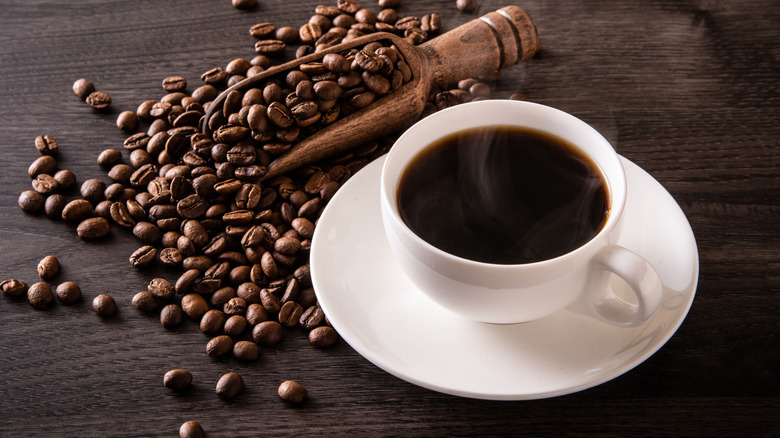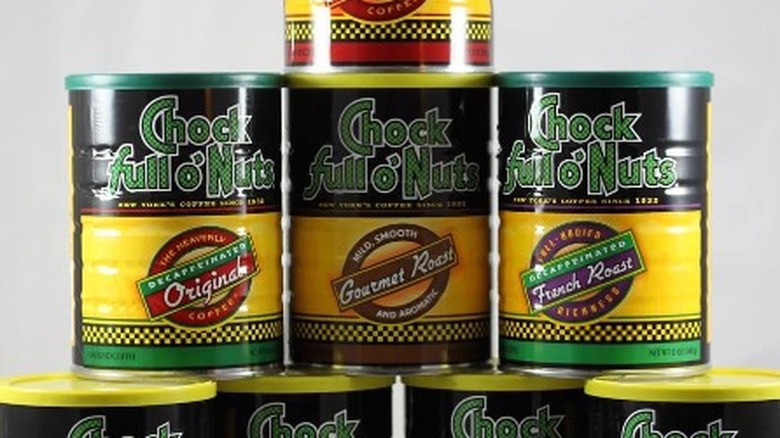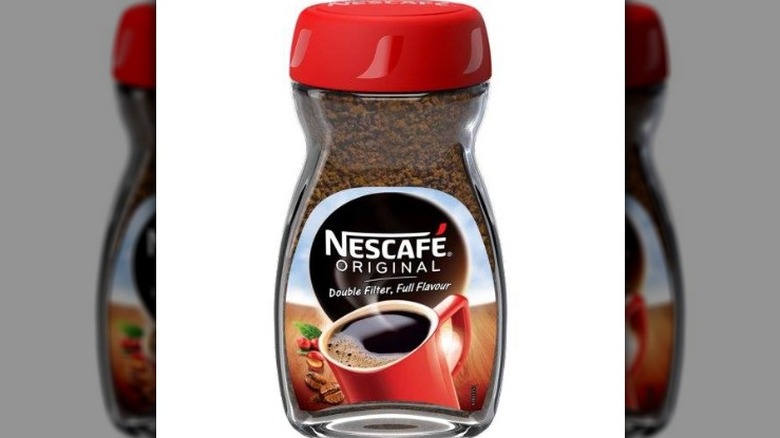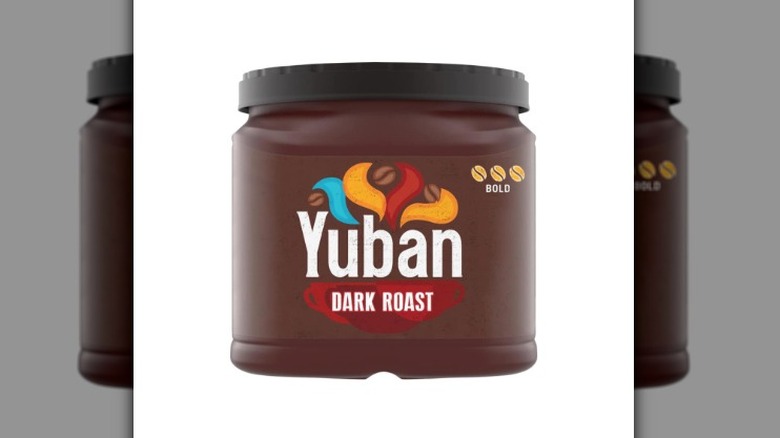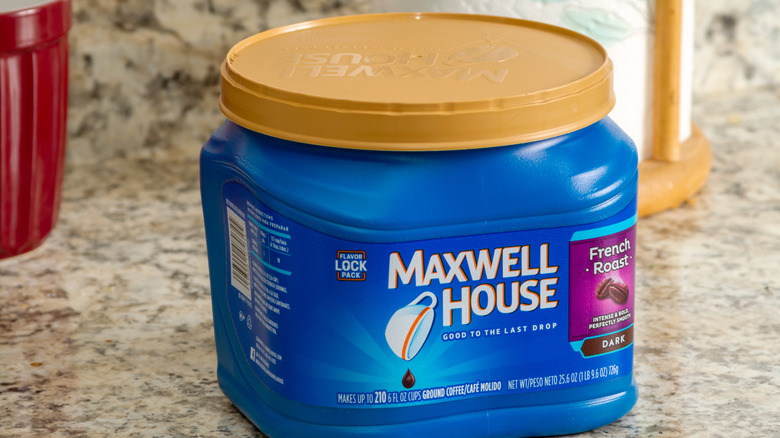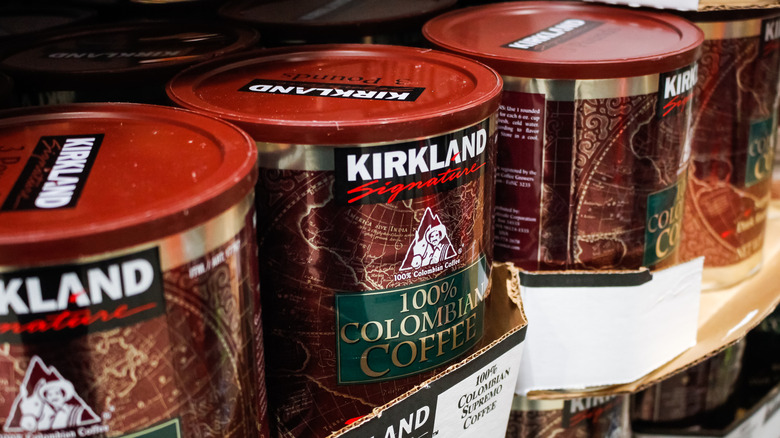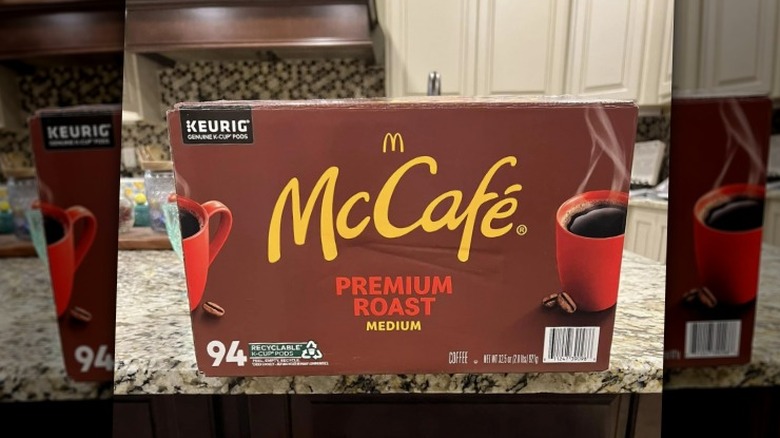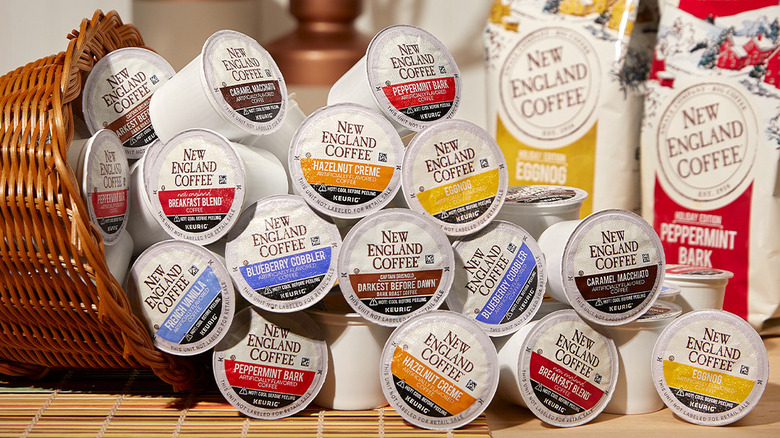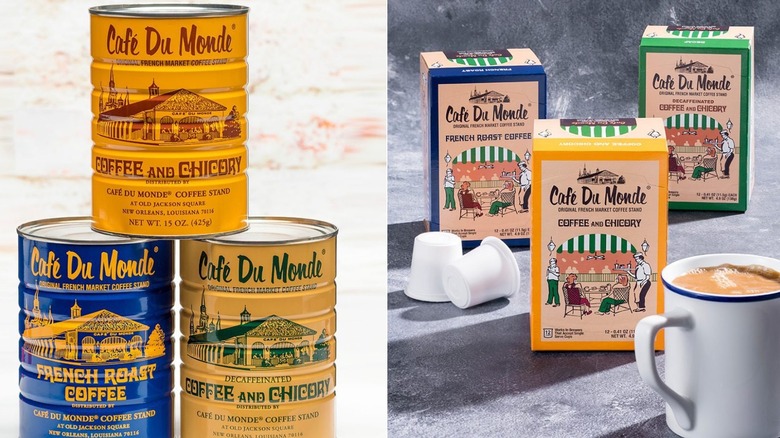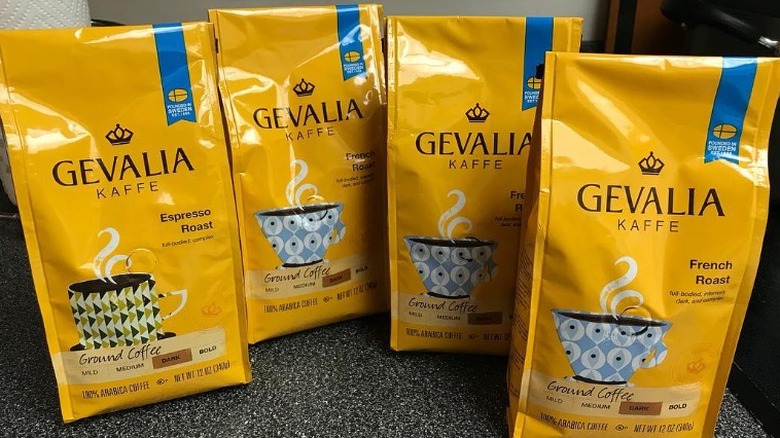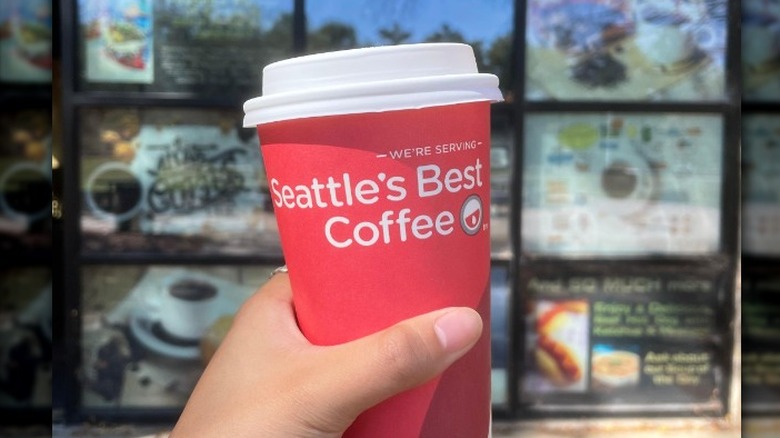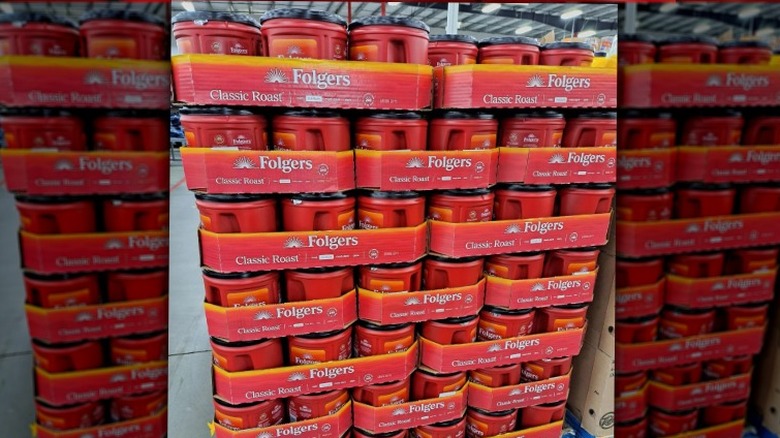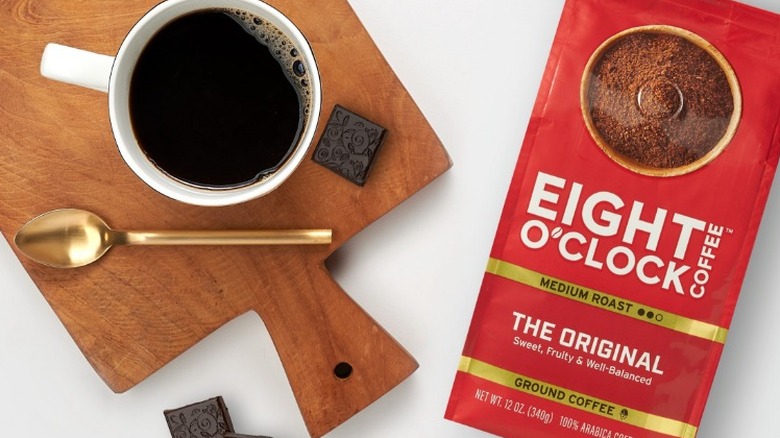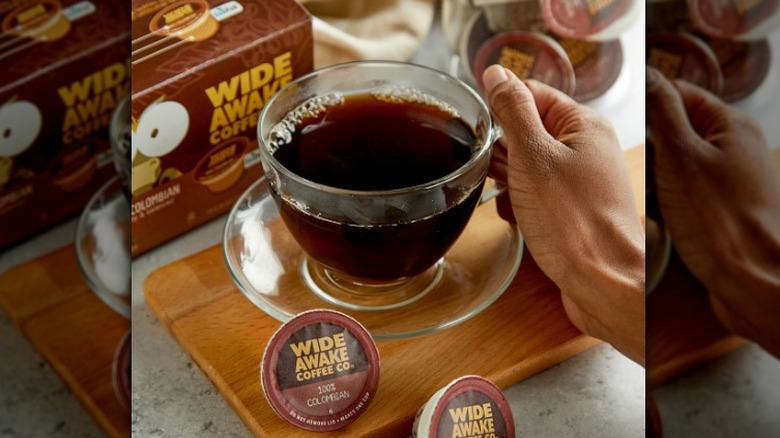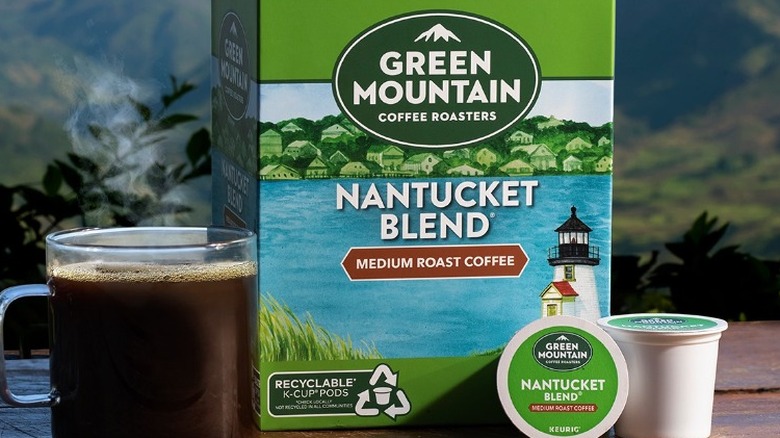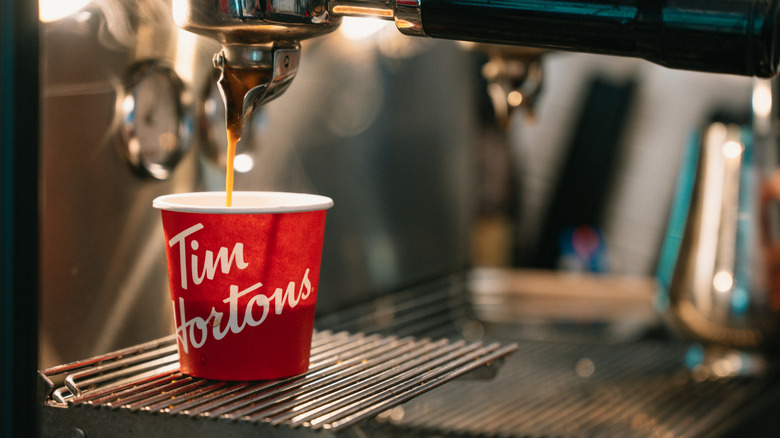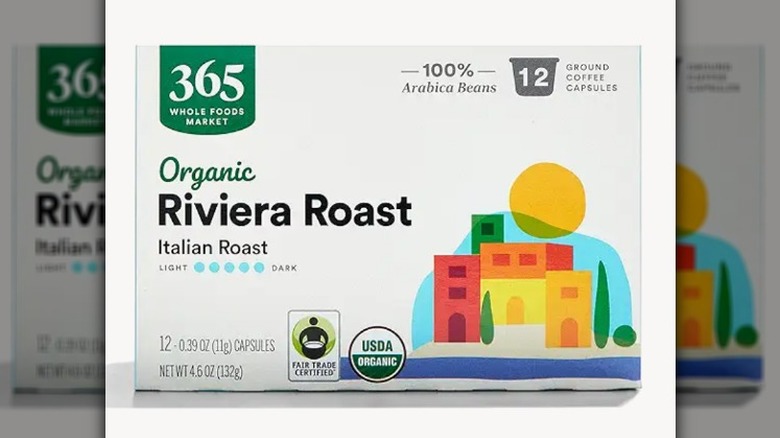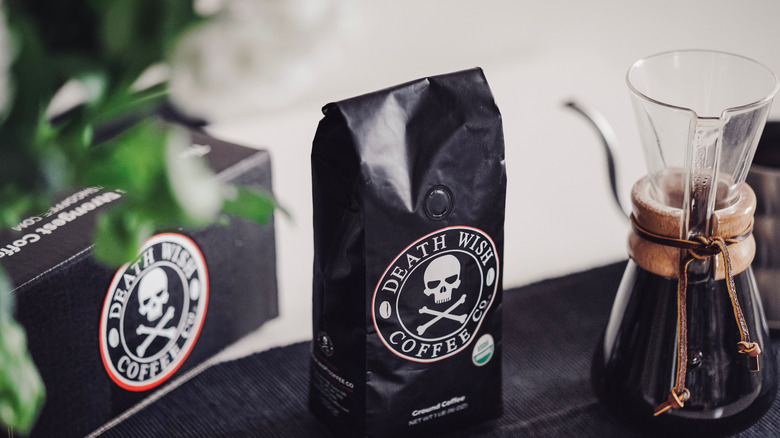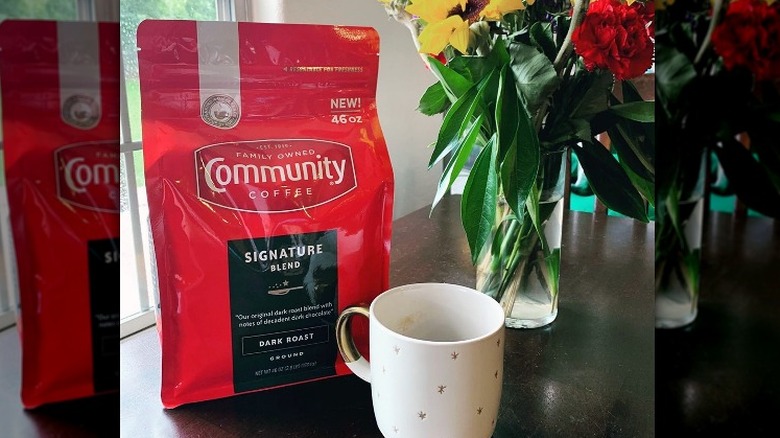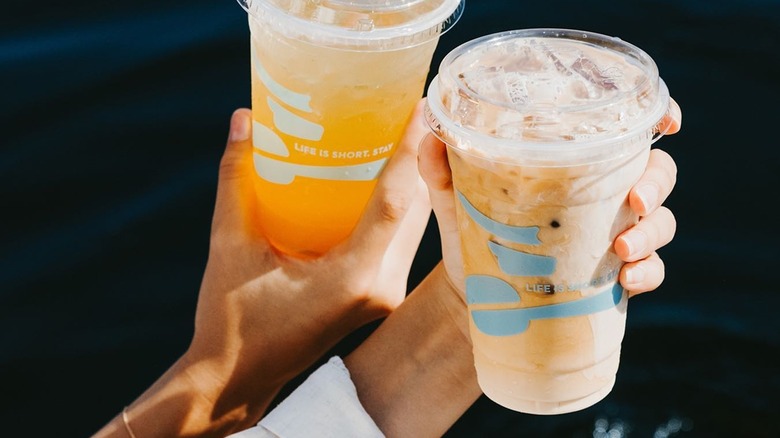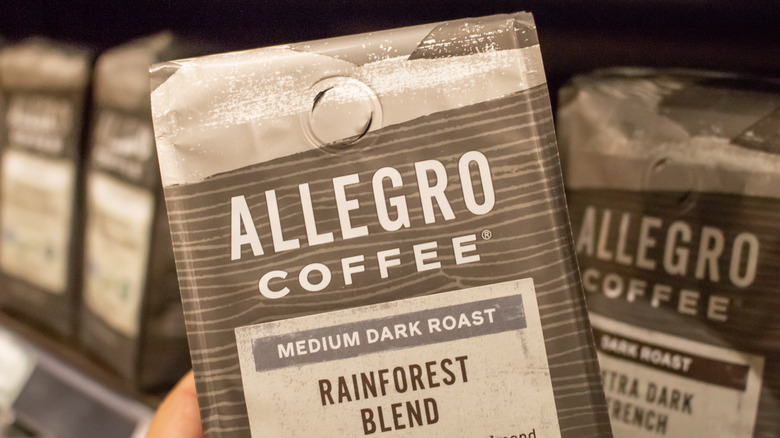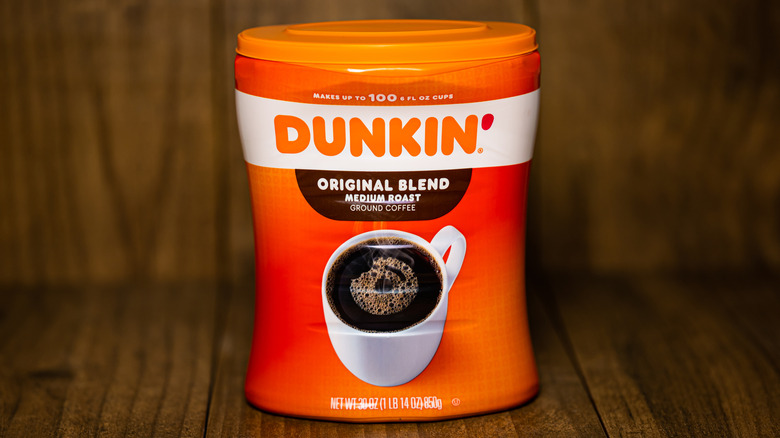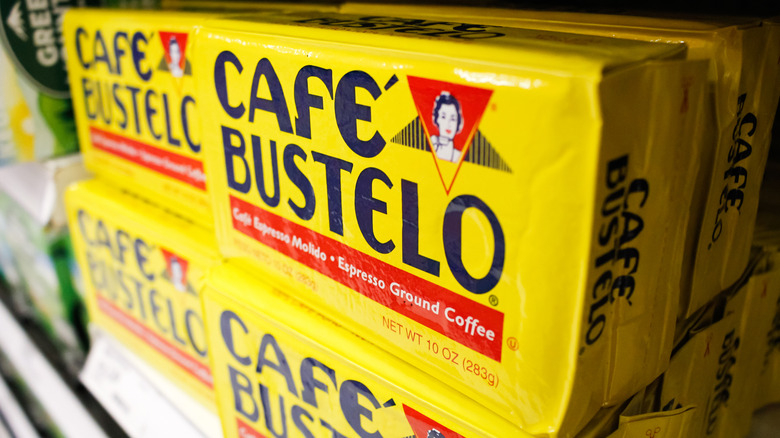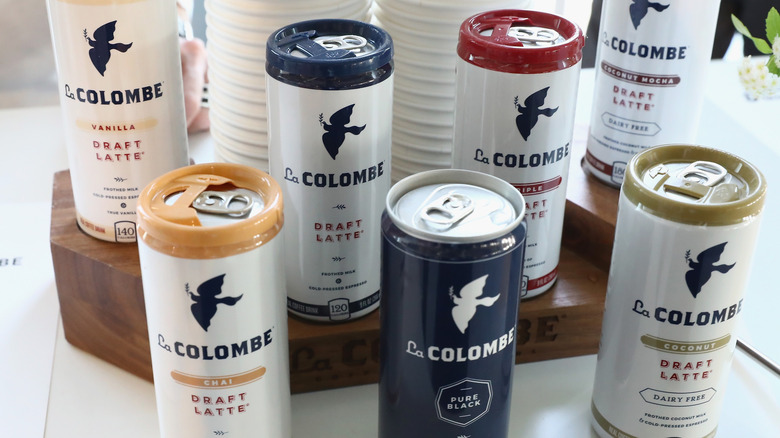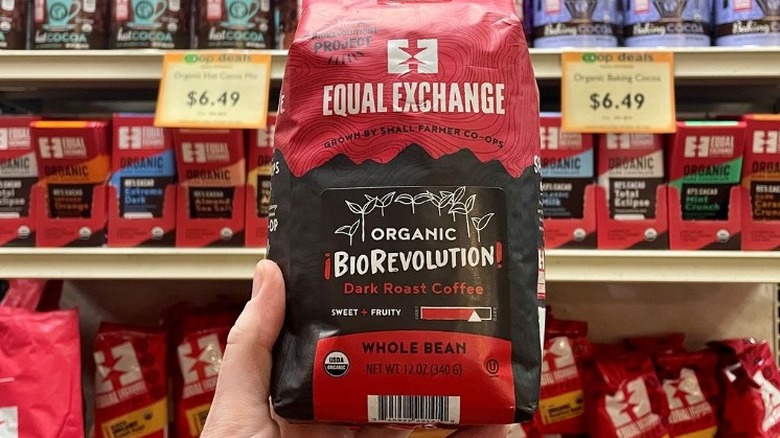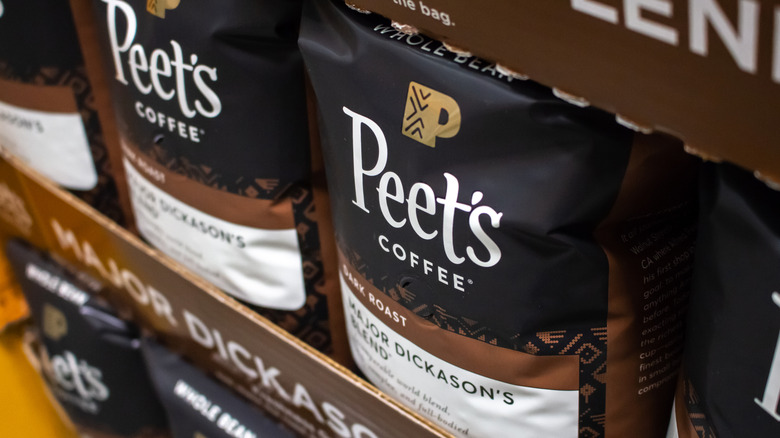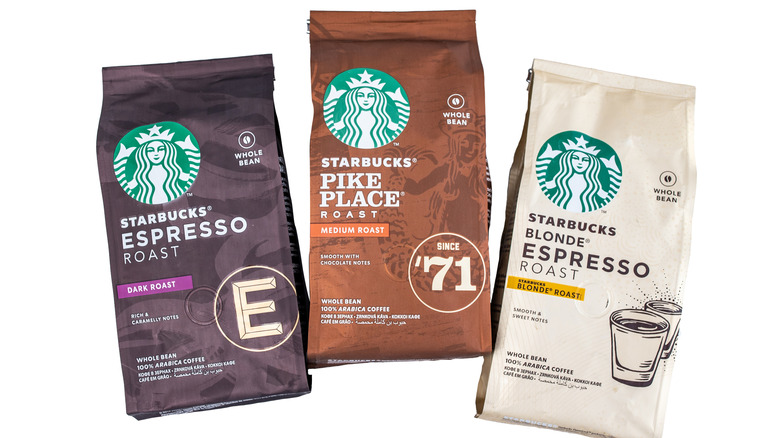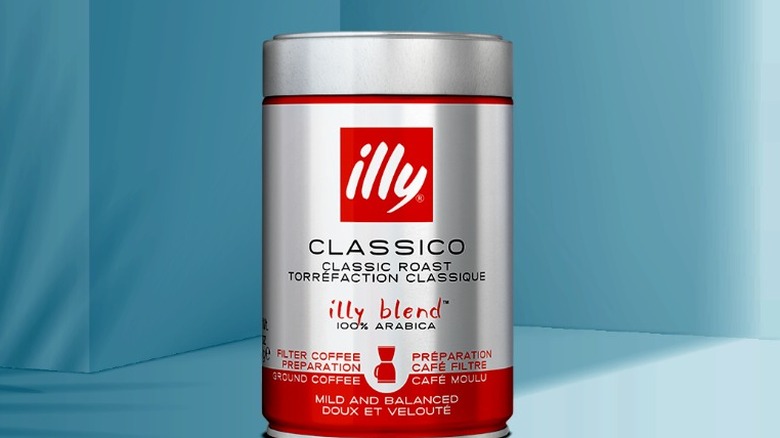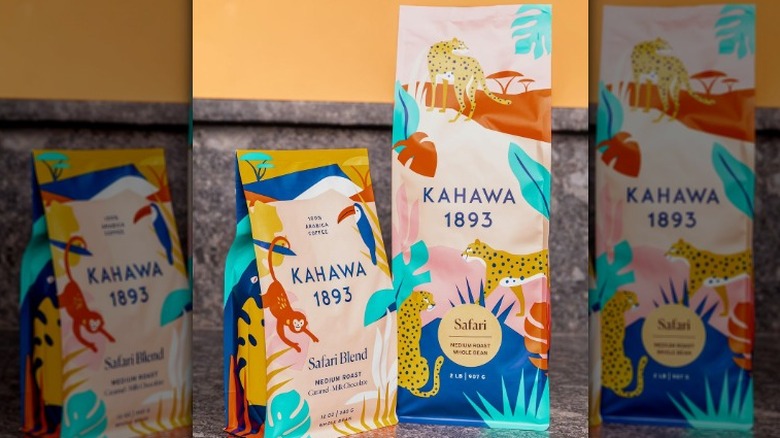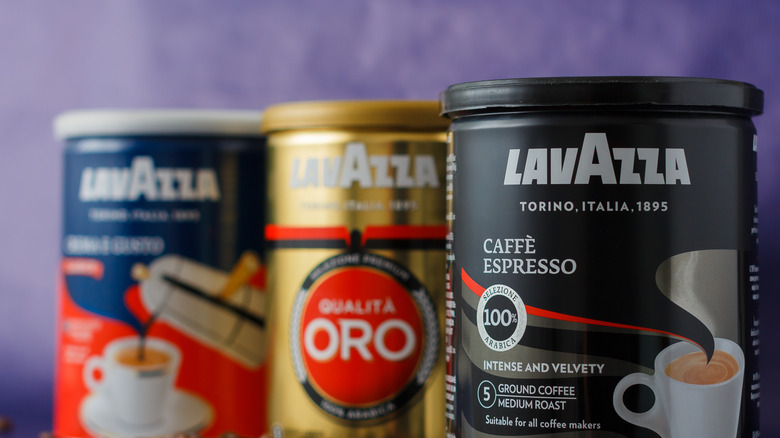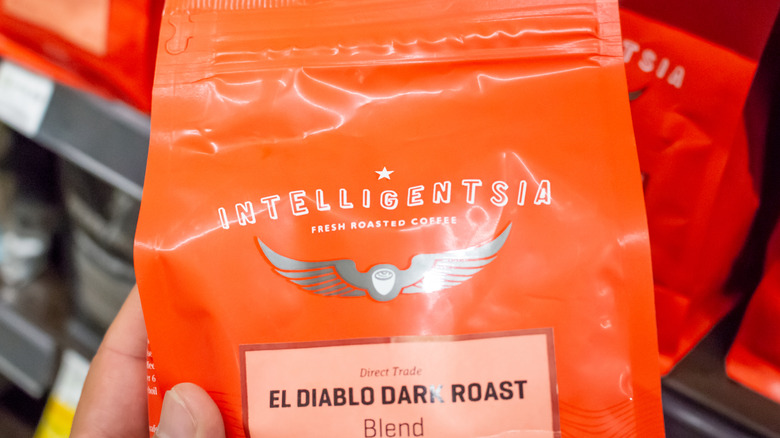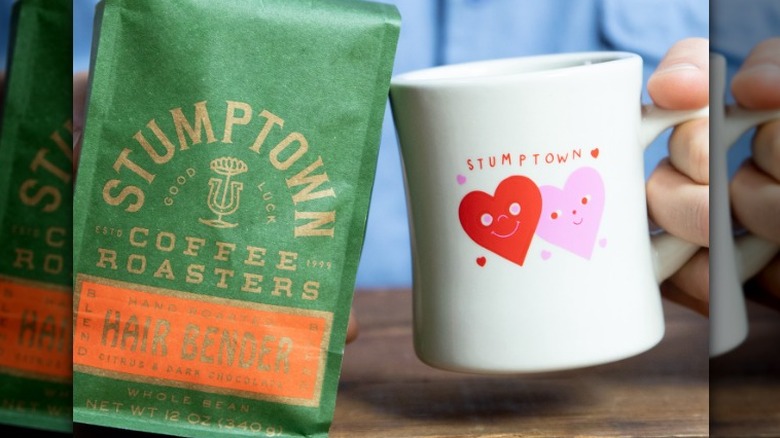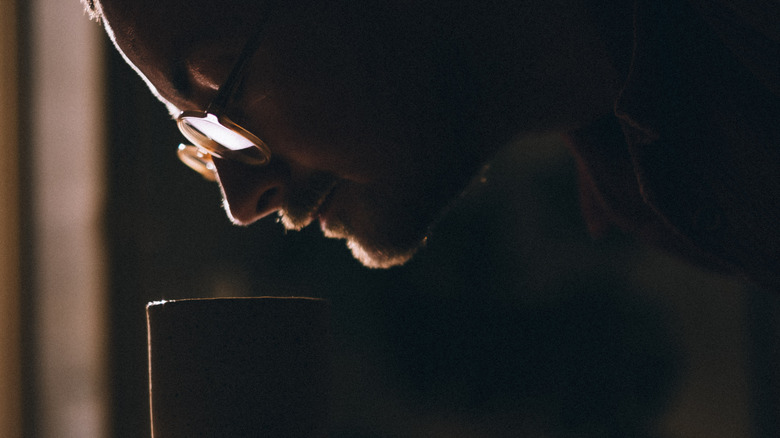31 Popular Coffee Brands, Ranked
We may receive a commission on purchases made from links.
For a large majority of us, the importance of a morning cup of coffee cannot be overstated. The breakfast beverage does more than just give you a daily jump of energy; often it is the first thing you taste after your toothpaste. Having an underwhelming brew can spoil your day, while a flavorful one can provide an inspiring start. In today's world of depressing news, there is no time to waste on a bad cup of coffee.
The National Coffee Association estimates that 62% of Americans drink coffee, and on average, those consumers drink about three cups daily. That's a lot of java flowing at home and in the best coffee shops across the U.S. The way that Americans consume their caffeine is always changing, but there are a handful of brands, roasters, and producers that have remained the most popular providers of coffee for years if not decades. Some of them rightfully deserve a place in the American appetite. Combining personal experience with information gleaned from grocery store shelves, coffee brand websites, and customer reviews, this list highlights where well-known coffee brands stand, in our humble estimation.
31. Chock Full o' Nuts
In 1926, an enterprising entrepreneur named William Black went into business roasting nuts. When the economy nosedived just three years later, Black changed the focus of his company, aptly named Chock Full o' Nuts, to begin roasting coffee beans (which were cheaper at that time). This leaves one to wonder if "Great Depression" is a term better used to tell the history of Black's java business or to describe the state of the unlucky coffee drinker who gets saddled with a can of this stuff.
All jokes aside, there is something to say about longevity, and Chock Full o' Nuts has it. After all, there is hardly a container of coffee that can sit on your grandmother's counter without ever changing flavors like this one. Whether you're popping the top on a newly bought can or you're using grounds that are indiscernibly old, you'll likely find yourself wishing that this coffee was chock full of flavor.
30. Nescafé
In the information section of the website for Nescafé instant coffee, the company labels its product as "100% pure coffee," which leads you to wonder, "What else could it be?" With an expiration date that is printed for two years beyond the time of purchase, it's a reasonable question to ask. Nescafé is an extremely popular instant coffee brand, but it reminds us of quite a few "Mean Girls" cliches — just because it's popular doesn't mean it's good.
Over the last few years, the brand has changed up some things in its instant coffee recipe, and the results leave even more to be desired than before. The concentration of heavy roasting flavors can be headache-inducing in some jars. Nescafé's website claims that its instant coffee jars are the best-selling coffee brand worldwide, which leads to yet another question: "Where in the world are all the taste buds?"
29. Yuban
Yuban has been on the market for over a century. This lengthy history might be enough to convince you that there is something tried and true about the brand, but a cup of these grounds will have you reconsidering. Despite being a staple on grocery store coffee shelves for years, Yuban's quality is now a thing of the past.
Perhaps it comes down to careless ownership by a mega-sized food producer like Kraft-Heinz, or maybe it is a result of today's coffee drinkers being spoiled by the third-wave coffee movement. Whatever the case, Yuban's popularity has more to do with tradition than flavor. These days, a cup of Yuban doesn't pack the same bold, bright flavors that it once did. It's hard to make old things seem new, and this coffee just feels (and tastes ... and smells ...) a bit stale. Fortunately, Yuban can still rely on sustainable business practices (and a Rainforest Alliance Certification) to be considered a leader in the coffee world.
28. Maxwell House
Of all the Kraft-Heinz products that exist on the market, Maxwell House is one of the most well-known. However, as other Kraft-Heinz coffees have proven, the high profile doesn't always translate to high quality. In the case of Maxwell House, it definitely doesn't. In fact, this coffee is so bad that even Kraft-Heinz once considered dropping it from its portfolio. For now, it remains a part of the family, which makes us wonder if the conglomerate has had a hard time getting rid of it.
Okay, so maybe poor taste isn't the real reason that the company has considered letting go of Maxwell House, but it is a reason that you should consider skipping it. Maxwell House represents some of the most profoundly un-fun parts of American coffee. It's the type of grind that you can dump into your drip machine without thinking about — a coffee that prioritizes convenience over the tasting experience that you deserve. Even among mass-marketed coffees, this one stands out, but not in a good way.
27. Kirkland's
When shoppers walk into Costco, there are no pretenses about what they're in for. For many foodstuffs, buying in bulk doesn't necessarily impact the quality of the product — and grocery store brands are getting fancier. Your favorite red can of potato crisps is still the same whether sold in a single unit or a pack of 12. Unfortunately, coffee is not one of those products. Costco's signature Kirkland brand is a mass-produced roast that can be reliable in a pinch and reasonable for your office coffee pot but doesn't deserve an honored spot in your home's pantry.
To be fair, Kirkland isn't bad coffee. It has a long shelf life (which kind of makes us pause), and it is affordable. Both of those non-taste-related aspects are Kirkland's strongest selling points. As for who makes Kirkland coffee, several styles of this brand are actually roasted by none other than Starbucks. However, like other brands on this list reveal (looking at you, Seattle's Best), just because it's made by Starbucks doesn't mean it is better than average. Sadly, that's what Kirkland Coffee is.
26. McCafé
You might be surprised to learn that when the first McDonald's franchises opened in 1955, coffee was one of the items sold. We can only hope that it tasted a bit better back then. A more commonly known, present-day fact about McCafé coffee is that it is served at a ridiculously hot temperature. That makes "burned-out taste buds” a reasonable (and maybe the only) excuse for drinking this coffee. We'll call it plausible deniability.
McCafé drive-through coffee certainly has a set of dedicated fans, but the coffee available in stores seems like it was made specifically for its worst enemies. McDonald's is known for consistency, and the flavor here is consistently bad. From light to dark roasts, it all has the same note: burnt. A fresh pot of McCafé manages to taste like it's been sitting on the hot pad of the machine for hours. Even microwaved coffee is better than this.
25. New England Coffee
A cup of New England Coffee begins the journey northward to higher latitudes and higher qualities of java. (Unfortunately, being better than coffees like McCafé is nothing to brag about.) The brand has been part of a Northeast coffee tradition since 1916, although for the past nine years or so, it has been owned by a New Orleans-based food company. The Big Easy is a city that has a storied café history; however, as New England Coffee shows, that doesn't directly translate into a bold brew, despite the clear effort to stand out when it comes to flavor.
New England Coffee offers seasonally roasted blends like Peppermint Bark and Gingerbread. There is even an Eggnog flavor, though it takes an adventurous taster to appreciate that blend, and too much can be stomach-turning. Outside of the holiday styles, New England Coffee creates other novelty flavors like Butter Pecan, Pistachio Crème, and Blueberry Cobbler. The case of this coffee brand is best described as a jack of all trades, master of none.
24. Café du Monde
Café du Monde is another regional coffee like the New England brand, only this company is still in production in its original home city. New Orleans has a lot of different coffee companies these days, but Café du Monde's specialty chicory roasts are one of the originals. The beignet stand has been around since 1862, with coffees available nationwide for a good portion of that long history. Despite such a storied past, Café du Monde coffee requires a particular type of taste bud to be truly appreciated.
During hard times when coffee wasn't readily available, chicory root was often used as a supplement to be roasted along with beans, strengthening the flavor and volume of a hot cup. While the mass market of coffee has made the addition of this perennial plant irrelevant, New Orleanians have stuck by tradition and taste. Because of this attachment, a cup of Café du Monde coffee is going to be slightly more bitter than average, with an earthy taste. It's a unique flavor, but not one that's easy to consume on the daily.
23. Gevalia
Gevalia isn't the first foreign coffee brand to appear on this list (that honor goes to the Swiss-made Nescafé), but it is the first to draw a distinction from its origin. Unlike others, the flavor of Gevalia isn't bad so much as it is different, darker, and all-around tougher to drink for the average American coffee consumer. That is owed to Gevalia's Swedish roots and maybe even the overall lack of light in the Nordic country. Dark coffee must be pretty warm during the excessive nighttime hours.
Gevalia does boast the use of high-quality coffee beans, an attribute that positively influences the full taste of the company's roasts. However, in many roasts that taste is just too full, bordering on burnt and bitter. The company claims its roasting process specifically removes the flavor of cooked coffee, but it's tough to find a bag of grounds where it isn't present. If you enjoy heavily flavored coffee, Gevalia might be for you, but if a strong aftertaste isn't your thing, then consider another brand.
22. Seattle's Best
Seattle's Best is a coffee brand owned by Seattle's biggest. In 2003, Starbucks purchased Seattle's Best to build inroads with working-class coffee drinkers who viewed the Pike Place business as too trendy. Since then, Seattle's Best has been aggressively marketed across the country as a more approachable alternative from a city known for its quality coffee.
Unfortunately, quality coffee, this is not. Seattle's Best has an overwhelmingly bitter note to it. Despite offering a wide array of coffees that range from light to dark roasts, each bag features an astringent bite that hangs around every crevice of your mouth. The poor flavor of Seattle's Best may actually just be a ploy to push coffee drinkers a little closer into Starbucks' open arms. Overall, this is Seattle's Best in name only. To really get a taste of the city's top roast, grab a bag of Starbucks' Pike Place.
21. Folgers
Once upon a time, Folgers' catchy jingle about being "the best part of wakin' up" could have been called an exaggeration. In today's turbulent era, where notifications about the impending doom of the world have become our morning wake-up call, it's reasonable to rely on a dependable cup of coffee to protect your inner peace. Folgers is that trusty morning brand. The aroma recalls your earliest experiences with coffee before you knew what it tasted like.
No one is claiming that Folgers is the top coffee on the market. It works best in drip machines and doesn't really offer much for manual coffee gadgets like a French Press or moka pot. Still, for the majority of American coffee drinkers who are brewing their caffeine by the pot, Folgers has a mild flavor that can satisfy the masses. It won't thrill those who have a taste for specialty gourmet roasts, but it also won't (deeply) offend them, either.
20. Eight O'Clock Coffee
In recent years, Eight O'Clock Coffee seems to have gained popularity with modern coffee drinkers by becoming the K-Cup brand that can be found anywhere, from grocery markets to office supply stores. However, this company has been selling java since 1859. An inexpensive price tag is one of the big draws that Eight O'Clock Coffee offers, but the flavors aren't too bad either. It's not hard to do better, but you could also do much worse.
Eight O'Clock offers specialty flavors such as Mint Chocolate, French Vanilla, and Hazelnut, but these notes are often only strong on the first few sips. Eventually, the taste fades out before any pleasant aftertaste can develop. Instead, stick to reliable roasts such as Original or Donut Shop. These coffees offer a more even-keeled flavor from start to finish and certainly won't send you running to escape from Eight O'Clock Coffee roasters.
19. Wide Awake Coffee Co.
Wide Awake Coffee Co. flies off the shelves, and that's not just because its mascot is a big-eyed owl. From single-serve pods to cold brews or bagged beans, this brand provides a mild-tasting cuppa that's easy to consume on the regular. It's coffee that doesn't require a second thought, though there is attentiveness within the creation of Wide Awake's offerings. For example, some styles of individual K-Cup pods from Wide Awake are compostable, providing an entirely different attraction that goes beyond flavor. This is a good thing because the flavor doesn't necessarily go the distance.
All in all, this java is not memorably strong, nor does it have a super unique taste. Sometimes, though, there are benefits to being benign. The cold brew bottles make a trustworthy travel partner when you need to take your coffee on the road. Flavors like Sea Salt Caramel or French Vanilla can be a welcome switch-up when you're craving something different. Wide Awake Coffee isn't terrible, but neither will it make you hoot with happiness.
18. Green Mountain Coffee Roaster
Perhaps the most frustrating thing about drinking java from Green Mountain Coffee Roasters is that the most common way to get a hold of it is in K-Cup format. Once upon a time, the tiny, gourmet Green Mountain roasting company was renowned for its dedication to eco-friendly practices. After the founder's investment in the Keurig company, that all changed. Now, for better or worse, Green Mountain is synonymous with the egregious environmental operations of the single-serve coffee business. For a cup of coffee that is just so-so, you can do much, much better.
Unlike many other coffee roasters on this list, Green Mountain doesn't waste time with a ton of fancy flavors. Instead, it sticks to producing different roast intensities ranging from lighter breakfast blends to darker French roasts. The result of that focus is a product that has a balanced, albeit middle-of-the-road flavor. Like a green mountain, this brew is peaceful and relaxing: no caffeine jitters, no acerbic flavors.
17. Tim Hortons
In the icy tundra of Canada, the merits of a strong cup of coffee cannot be overlooked. For popular chain establishment Tim Hortons, they aren't — or at least they weren't for a while. But as the world spins faster each day, some things get left behind, and in the opinion of many, "Timmies" seems to be leaving quality behind when it comes to its coffee.
Tim Hortons coffee used to be great. Now, it's just okay. The cultural icon hasn't descended to the ranks of McCafé bad (fortunately for Canadians), but in recent years, it hasn't been able to overcome its "meh-ness." Changes in once-popular flavors have left dedicated customers out in the cold, while bad press often keeps new ones from skating into stores. If Tim Hortons is your only choice, it isn't a terrible one. However, if it is one of many options, then you should consider a different play.
16. Whole Foods 365 Everyday Value
As the name suggests, the Whole Foods 365 Everyday Value brand is a dependable workhorse for your regular coffee slurping needs. A wide range of roasts covers the entire spectrum of what any coffee drinker could want. Each blend provides something different, but they all have one thing in common: quality coffee served at a value price. The cost starts at around $13.99 for a 24-ounce package, which is one of the most inexpensive specialty-tasting coffees on the market.
If you prefer a lighter roast, the Hometown blend is a sure bet. The beans arrive less oily than other heavier, darker roasts, and the chocolatey notes are as comforting as coming home. Overall, if you don't consider yourself hubristic enough to take on the title of a coffee snob, then 365 Everyday Value is quality enough to satisfy your search for a crafty roast that features nuanced notes.
15. Death Wish Coffee Co.
Death Wish Coffee Company is the badass of bean brands. With a proud skull and crossbones logo, it is described as the strongest coffee in the world. In 2022, the company began a collaborative series with some of the best tattoo artists across America, exploring sparks of creativity fueled by caffeine. Those art designs have gone on to become a line of new merchandise, which is much safer than having a genius who is jittery from too many cups of Death Wish trying to draw a straight line on your body.
In the case of Death Wish, hyper-caffeinated doesn't mean bad flavor. Actually, these roasts are really tasty. In particular, the Medium, slightly less acidic and with more varied notes than the drastically heavy Dark Roast, is a big hit. What it comes down to is that for many coffee consumers, a daily cup of Death Wish might be asking for just that. If you want to avoid heart palpitations, consider picking up this kick-butt brew as a new option in the rotation rather than an everyday sipper. However, if you like to live on the wild side, go ahead and write yourself a Death Wish.
14. Community Coffee
Community Coffee has come a long way from its humble origins as a family-owned roaster in Baton Rouge, Louisiana. Over 100 years later, it is still a family-owned roaster. Now, Community Coffee can be found all across the country, with coffee beans from all over the world. They are sold in a variety of brew methods, from single-serve pods to whole beans and pre-ground blends.
A dark-roasted Signature Blend still matches the original formula that was cooked up in 1919, but there is plenty of diversity in Community Coffee nowadays. The single-origin roasts from Guatemala and Mexico have bright, fruit-forward notes that develop progressively with each sip. The wide array of imaginative flavors (like Mardi Gras King Cake) will make you want to mambo around your breakfast table. Even the more traditional blends have a decently strong taste without coming off as harsh. Overall, Community is a reliable coffee with enjoyable roots.
13. Caribou Coffee
Caribou Coffee began as a small roastery and shop in the far-off land of Minnesota, but these days, its cafés and bagged beans can be found in just about every state. There isn't much to mention about Caribou in terms of its process or company values; it is Rainforest Alliance Certified, but it doesn't have an Equal Exchange-like focus on sustainability; the coffee is fresh but not process-driven like Peet's. Still, whatever the company is doing up there works. The simple roasts are hardy and lack bitterness.
Caribou's motto is explanatory: "Life is Short. Stay Awake For It." Its product offerings match the catchphrase. Caribou java is strong enough to pull a sleigh. The highlight of the bagged offerings is dark roasts like the Mahogany Blend, which has a loamy profile that eases you right into the demands of the day. Lighter selections have bright pops of tangy flavors. Caribou has a small line of pods and enough options for canned cold brew to strengthen its position on the list. When considering the quality alongside the value (this is a very affordable coffee), Caribou stands out as worth the buy.
12. Allegro Coffee
Allegro Coffee is most widely known as the in-house café and roaster of Whole Foods. Besides operating out of a massive facility in Denver, Allegro also has micro-roasters across the country. These small production sites have been nestled in various store locations since Whole Foods purchased Allegro in 1997. Because of the pandemic, Amazon began shifting those roasting spaces into grocery delivery prep rooms, but the company still leverages its logistics infrastructure to deliver the freshest Allegro blends to stores nationwide.
That is what makes Allegro such a quality coffee to have. Beans are fair-trade certified, and an organic line of coffee has bright pops of flavor that hail from numerous regions of the world. In particular, the Mexican Chiapas roast has a rich and creamy flavor that still manages to provide a crisp note along with a bit of nuttiness. Allegro Coffee has been building relationships that are lucrative for farmers since the '70s, so not only are these coffees reliably flavorful, but they are doing good work as well.
11. Dunkin'
What started as a single donut in 1950 has risen to become an international behemoth of the coffee world. Whether at home or on the road, Americans run to get Dunkin' coffee wherever it can be found. From K-Cups to specialty flavors, it is easy to taste why. With the brand's increasing dedication to coffee over the last few years, it's no wonder Dunkin' officially dropped "Donuts" from its title.
Making Dunkin' coffees at home is nearly identical to what you would taste when ordering in-store, at least when it comes to your favorite drip coffees. There is a mix of funky and fun pastry-style varieties like Chocoholic Pancake and Cinnamania, but the basic roasts offer the best taste of a quality coffee done right. If you need something familiar but not boring and full of flavor without being over the top, Dunkin' is the right roaster for you.
10. Café Bustelo
Café Bustelo is roasted from a rich international heritage that encompasses the coffee traditions of Latin America. It is a coffee inspired by the rich and robust flavors of the Latin nations, which play a crucial role in providing raw coffee beans to the rest of the world. Café Bustelo may be on the darker side when it comes to flavor, but in this case, that is something to savor.
A cup of Café Bustelo can nearly be tasted before it is poured. The scent that emerges when brewing is full and aromatic and fills your nose, mouth, and mind with expectations of what's to come. The first sip never fails to live up to that hype, morning after morning. Maybe it comes down to the freshness of the vacuum-sealed packaging, or maybe it comes down to years of authentic roasting. For coffee drinkers, expect to go down to the bottom of your cup every time.
9. La Colombe
La Colombe has rocketed in popularity recently. Not only are the bags of fresh grinds and whole beans securing space among other specialty brands on grocery shelves, but the single-serve cans of cold brew and draft lattes are also lining displays front and center. A taste of this bean water proves to even the most sophisticated taste buds that the notoriety is well-earned.
Oat milk is the coffee creamer of the moment, and La Colombe is taking full advantage of both products' time at the top. Cans of draft lattes, made from a cold brew that has been premixed with coffee creamer, can be found in plain oat milk latte forms as well as with an added spritz of vanilla, caramel, chocolate, or in nitro brew fashion. Popping the top on these silky smooth beverages fills you with inner peace, which may be why the company chose a white dove as its logo.
Beyond the chilly drinks, La Colombe has an internationally inspired line of ready-to-brew coffee. The top-rated Corsica is a dark roast beloved by all, full of red wine and spiced notes. On the opposite spectrum, a San Roque light roast tastes like cherry soda. Right in between these two are blends motivated by the flavors of Monaco, New York, and Brazil.
8. Equal Exchange
Equal Exchange coffees are one of the few where quality and value can be seen in more than just the end product and price tag. The mass coffee industry is rife with exploitation, but Equal Exchange, which also offers chocolate and tea, evens the playing field by focusing on fair, alternative trade practices that uplift marginalized groups. The result is a bag of beans that you can trust in a multitude of ways: Equal Exchange matches your eco-ethics, generates justice for those slighted by the coffee world, and tastes amazing.
The best word to describe this brand is smooth. From the first mouthful to the last, its coffee is delightfully palatable. In particular, the Women in Coffee series, which highlights female-led coffee operations in the Equal Exchange supply chain, presents two different blends that are each a revelation of slightly sweet, brown-sugar-noted beans. Equal Exchange should have little competition for your morning cup.
7. Peet's Coffee
The legacy of Peet's Coffee goes far beyond the history of this one company. According to the Seattle Times, Dutch immigrant Alfred Peet, the founder of this self-named coffee company, actually inspired Starbucks and provided the first roasted beans that the shop would use at its Pike's Place store.
Peet's dedication to overseeing the manual roasting process of his namesake beans can still be tasted today. A mug of Peet's coffee will take you back to a time before convenience and quick service ruled everything. Similar to Café Bustelo, Peet's emphasizes locking in freshness during the post-roast process by sealing its bags immediately. The care that is involved in this process allows both blends and single-origin beans to fully display their flavors with every swig. Peet's does come at a slightly higher price point, but it is good enough to save you money by turning your kitchen into your new favorite café.
6. Starbucks
Decades of expansion across the American coffee landscape have proven Starbucks as more than just a passing fad. Before it was known as the place to get sugary, limited-time novelty beverages, Starbucks was introducing traditional espresso-based drinks to a country that was largely unfamiliar with the taste. These days, it's likely that you associate the company with trendy, flamboyant offerings, but the café chain has stuck true to the roots of roasting a simple but great cup of joe.
Starbucks rose to prominence by offering a darker, richer brew, but fortunately, that doesn't translate to burnt flavors. In fact, the offerings are so expansive these days that you never have to get close to a dark roast from Starbucks if you don't want to. The blonde espresso, sold ground or in whole beans, is proof of that. Additionally, those fortunate enough to live close to a Starbucks Reserve Roastery can experience the iconic coffee in its freshest form, with roasts that are singular in quality and consistency. That said, if you're looking for Starbucks drinks with the most caffeine, there is always the signature Pike Place roast to meet caffeine heads where they're at. It is a potent cup with an accent of toasted nuts.
5. illy Coffee
When you think of quality espresso, it's hard not to let your mind drift toward a daydream of an idyllic Italian scene. Your kitchen may not look like a gleaming Sicilian villa or a bustling café on the streets of Rome, but illy can make it smell like one. The 100% Arabica roasts of illy can be purchased in many forms — the iconic silver tins hold whole bean or ground coffees, with the latter being sold in different particle sizes depending on whether you intend to brew drip, espresso, or moka pot.
Although illy is often used as an espresso coffee, the magic of it is that the brand has made its coffee ideal for extraction; the coffees aren't oily and retain a smooth and balanced note rather than tasting burnt or sour. To be fair, illy comes at a fairly higher price point than most grocery store coffees. It also comes with an incredibly fine flavor. In addition to the 8.8-ounce tins, illy's full lineup includes pods for your single-cup machine and some of the best instant coffees under the Tuscan sun (and anywhere else). Even so, stick to the ground drip, Classico, in case you don't believe it.
4. Kahawa 1893
Chances are that when you head out to shop at Trader Joe's, you already know a lot of what's going to be dropping in your cart. The Triple Ginger Snaps and Two-Buck Chuck — some items are mandatory pickups. This is why a trip to TJ's feels more like comfort shopping than the adventure that it could be. It's tough to find new things when there are so many reliable and exclusive products. However, one new addition to the shelves that can't be missed on your next grocery run is Kahawa 1893. It is a premium coffee brand that sources directly from farmers on the African continent. Kahawa means coffee in Swahili, but for founder Margaret Nyamumbo, the brand also means returning to a family business.
Kahawa 1893 sources beans directly from women farmers in Kenya and Rwanda — love and appreciation for the art of growing coffee can be tasted in every bag. And beans taste better when you know they are serving a good cause. The mission is amazing, and the coffee will be a highlight of your week. Canned black coffees provide a unique taste of fruit-forward, light roast coffee, and beans from Kenya and Ethiopia offer floral flavors that are profound but not too acidic.
3. Lavazza
Starbucks may be the biggest backer of espresso in America, but never forget that the origin of this coffee-making technique comes from Italy. If you ever need a reminder, pull a bag of Lavazza from your store shelves. From the first scoop of grounds to your final mug, this brand of beans will take your morning redeyes and turn them into a leisurely flight to the world's cappuccino capital.
Lavazza coffees are known for relative intensity, and each roast comes clearly labeled with where it sits on the scale. The Classico is coveted by those who like it bold, but the Gran Selezione holds the crown. The chocolate-forward accent makes it a morning cup to savor slowly. It may be a seven on the intensity scale, but it is a 10 of 10 in terms of taste. Other blends can come in lower intensities but still pack as much flavor as a true espresso. Lavazza has a full line to display these flavors across, including some of the better-tasting Nespresso capsules and K-Cups on the market. The flavor remains consistent even in these convenience-forward methods, especially with Lavazza's line of Blue Capsules, which focus on single-origin roasts and can be brewed twice.
2. Intelligentsia
Intelligentsia calls itself the world's best coffee, and it isn't far off the mark. This brand might be better labeled as the world's smartest coffee. In many circumstances, Intelligentsia has put the lion's share of focus on plant genetics. By ensuring that its coffee can be directly traced, or is at least a relative bean to a coffee that hails from Ethiopia's "primal coffee forests," Intelligentsia primes each roast to have a specific profile. Intelligentsia aims for fruit-forward varieties, and though the logo is a star, there isn't any wishing on a celestial body here. This coffee is a sure thing.
With some specialty brands offering high quality at a high value, you might not get into the habit of drinking Intelligentsia every day. A bag of it can run a pretty penny, but it is worth the money to have on the days when you deserve an especially good cup. True to form, the roasts have fruitier profiles, especially in the single origins, which hail from the farthest-flung corners of the coffee-growing world. It's not uncommon for an Intelligentsia coffee to leave the taste buds tingling with bright bursts of honey, nectarine, and cherry. There are very good blends as well, such as the El Gallo, which is prominent in chords of milk chocolate and cherry cola.
1. Stumptown Coffee Roasters
Among a list that includes coffee producers that have been in business for a hundred years or more, giving the top position to a relatively new roaster might seem outrageous. However, Stumptown's coffees are outrageously good. A mix of blended and single-origin beans spans the globe, but many offerings include beans sourced from small-scale farmers growing numerous varieties of beans. Since opening in the 1990s, the Stumptown method has slowly percolated the company into a superior position in the world of coffee, boiling into the crème de la crème of caffeine companies.
Through a dedication to coffee science, and careful consideration of the product it sources, Stumptown offers coffee beans that encompass the complexity of what coffee really is. It does so in an approachable way, encouraging a learning experience with each cup. The bagged offerings are some of the higher-priced choices on this list, so purchasing one is more of a splurge than it is an everyday habit. Stumptown also offers a range of ready-to-drink beverages, like glass-bottled plain cold brew and cardboard sippers mixed with Oatly. Despite the price, having Stumptown coffee on hand for special occasions or a slow weekend morning can change the way you see and taste coffee.
Methodology
Like most folks, I drink my fair share of coffee. I've also attended numerous cupping sessions and speak regularly with industry professionals on the best ways to taste and consider coffee. Throughout my career as a caffeine customer, I've personally tried more than two-thirds of the brands on this list. However, to begin this article, I needed more than my own experience.
I visited several of the largest grocery stores in my immediate vicinity and made a list of the most common brands on store shelves. Following this on-the-ground research, I took to the internet to search for other nationwide brands with high relevance and then constructed my list of the most popular based on industry sales numbers, market share research, and observed presence at the various shops I visited.
After developing the list, I took to ranking the brands on it. To do so, I conducted research across each company's website, which included gathering information on a brand's complete line-up of offerings, considering consumer reviews, and then taking into account the cost, mission statement, sourcing and roasting ethos, and overall quality of a coffee brand's product. Finally, I factored in my personal perspective, having consumed coffee from most of these brands in various forms.
